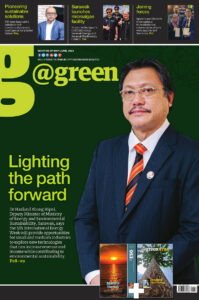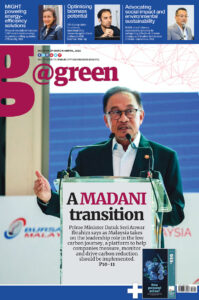Rapid urbanisation and rising population have caused countries worldwide to deal with many urban challenges, including pollution and waste disposal problems.
Malaysia is not excluded. With limited spaces for landfills, the country may not be able to accommodate tonnes of waste produced by its people in the future. To ensure that people continue to have access to a clean, healthy, and safe environment, adopting sustainable landfills and waste management is crucial.
 In an interview with @green, Nazar Abdul Raof, Chief Operating Officer of Alam Flora Environmental Solutions (AFES), a wholly-owned subsidiary of Alam Flora Sdn Bhd (AFSB), shared that Malaysians produced 38,000 tonnes of municipal waste per day. However, only around 20-25 per cent of the waste was recycled, while the remaining 80 per cent would end up in landfills.
In an interview with @green, Nazar Abdul Raof, Chief Operating Officer of Alam Flora Environmental Solutions (AFES), a wholly-owned subsidiary of Alam Flora Sdn Bhd (AFSB), shared that Malaysians produced 38,000 tonnes of municipal waste per day. However, only around 20-25 per cent of the waste was recycled, while the remaining 80 per cent would end up in landfills.
The scenario was different in European countries, where 80 per cent of waste was recycled and recovered, while the other 20 per cent would go to landfills. Nazar believed that there were still many things that Malaysia, as a nation, must do.
“For AFES, we focus on closing the gap. Previously, everything was dumped in landfills. Now, we want to divert waste and reproduce many things that are recyclables. We want to create shared values from the usual responsibility of collecting waste. So, all the wastes become values.
“For example, we can convert food waste to gas or protein. By doing this, we give it a new value. It is what we call a circular economy or the latest term, sustainability,” shared Nazar.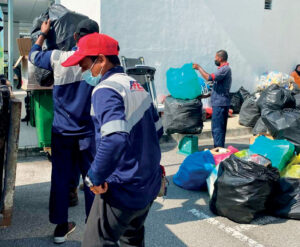
He said all wastes that usually ended up in landfills would be segregated, recycled and converted into new things. Rather than Malaysians calling them wastes, AFES wants people to refer to them as secondary raw materials.
Multiple environmental solutions
In assisting companies with their sustainability efforts, AFES provides four primary businesses, including asset facility management, infrastructure cleansing and waste solutions, waste management facilities and marine and scheduled waste facilities.
Nazar highlighted the business of infrastructure cleansing, and waste solutions included road-sweeping, drain-cleaning and grass-cutting. In addition to that, AFES also provides waste solutions services.
“Previously, people would collect and dump. Take Malaysia Airports Berhad as an example. We proposed the business to Malaysia Airports, building one sorting centre. We educate people in the airport. All the wet waste would go to landfills, and dry waste would go to the sorting centre.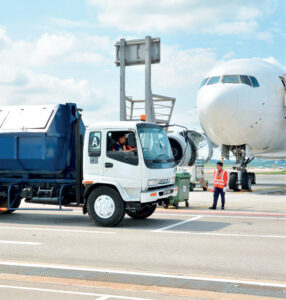
“By doing this, we were able to collect all the recycling data, and the data is shared with Malaysia Airports. So, Malaysia Airports has now comprehensive and verified sustainability data on recycling. As we advance, Malaysia Airports will become a green airport. We partner with Malaysia Airports to help promote it as a green airport. We want to be a sustainability partner for all industries in Malaysia,” he shared.
As for its waste management facilities, the company does not only manage waste collection, waste transportation, incinerators, and landfills; it also helps convert green waste to by-products such as wood chips and wood logs.
Determined to provide a holistic solution for sustainability, it also provides asset facility management for building management that covers energy efficiency, maintenance, and cleaning works. Instead of creating a new department to oversee the sustainability of their business, Nazar said companies could engage AFES to get a variety of services and achieve sustainability.
The first on-site port reception facilities in Malaysia
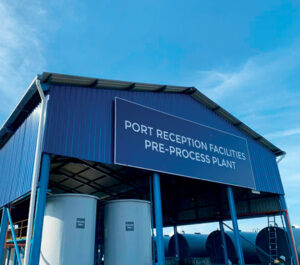 Touching on AFES’ Marine and Land Scheduled Waste Business, Nazar said: “Now, we have embarked on scheduled waste. Ships would park in a few ports in Malaysia, needing desludging.
Touching on AFES’ Marine and Land Scheduled Waste Business, Nazar said: “Now, we have embarked on scheduled waste. Ships would park in a few ports in Malaysia, needing desludging.
“Currently, we don’t have a proper solution for the desludging process. So, AFES became the first company in Malaysia to build the country’s first on-site port reception facilities (PRF).”
PRF is an integrated on-site facility, managing all types of waste at the port, including sea-going vessels generating waste categorised into three segments: scheduled waste, solid waste and sewerage.
With this facility, the waste at the port will go through pre-treatment processes before proceeding to (Department of Environment) DOE-licensed contractors for further recovery or final disposal at prescribed premises.
“We already have one on-site facility in Northport. The next one will be in Johor Port, and we hope Port of Tanjung Pelepas (PTP) and Penang Port will follow suit. We hope to forefront in building and managing this facility.”
Educating companies and public
Nazar said the sustainability awareness among Malaysian companies had improved significantly compared to the last 10 years. Many companies had reached out to AFES to get more information and data about sustainability, and they also started their sustainability initiatives.
“Most of our clients already talk about sustainability. We are happy to support them. Our purpose is bigger. Most of the companies will talk about profits. As for AFES, we talk about the triple bottom line (TBL) – profit, people and the planet.”
Nazar believed that education was essential to spread awareness on sustainability, and AFES strived to educate people about the topic. He shared that the company had done many programmes to promote the importance of sustainability and worked with the Ministry of Environment and Water (KASA) on its latest campaign, where they cleaned up the river.
Among other AFES’ green programmes were Eco Duta, Waste Wise, 3R on Wheels and 3R Boutique.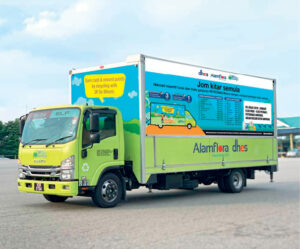
“We already built one complex in Putrajaya. We have an education centre, sorting centre and 3R Boutique there. At the boutique, we sell preloved clothes that we have cleaned up. We sell them at around RM2, and the money goes to charity. This is also part of sustainability as the clothes do not end up in landfills.”
Malaysia still needs landfills
When asked about Malaysia’s dependence on landfills, Nazar said people could proceed with other types of waste management, but Malaysia needed to have landfills for now. However, these landfills could be converted into sustainable landfills equipped with facilities to accommodate processes such as recycling and converting plastic to fuel, leachate treatment plants, education centres, etc.
“The landfill normally has gas. We need to tap the gas and use it back for the industry. That’s why we need to have landfills, but we call them sustainable landfills,” said Nazar, adding that these sustainable landfills might have longer lifespans compared to the conventional ones.
The federal government had also engaged AFES to assist Selangor with post-flood clean-up operations in December 2021. Using its years of experience in handling post-flood situations, AFES managed to speed up the cleaning works.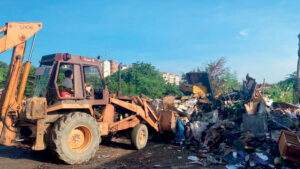
“Previously, when it was flooding in Manik Urai, Kelantan, we managed (the post-flood clean-up efforts). We also managed Pahang’s previous flood. For Selangor, we targeted 14 days to settle all assigned areas. But, Alhamdulillah, we have done it in 10 days.”
Nazar emphasised that planning was essential in post-flood clean-up operations. He shared AFES set up three operation rooms on-site during the Selangor flood to communicate better with the communities. — @Green


